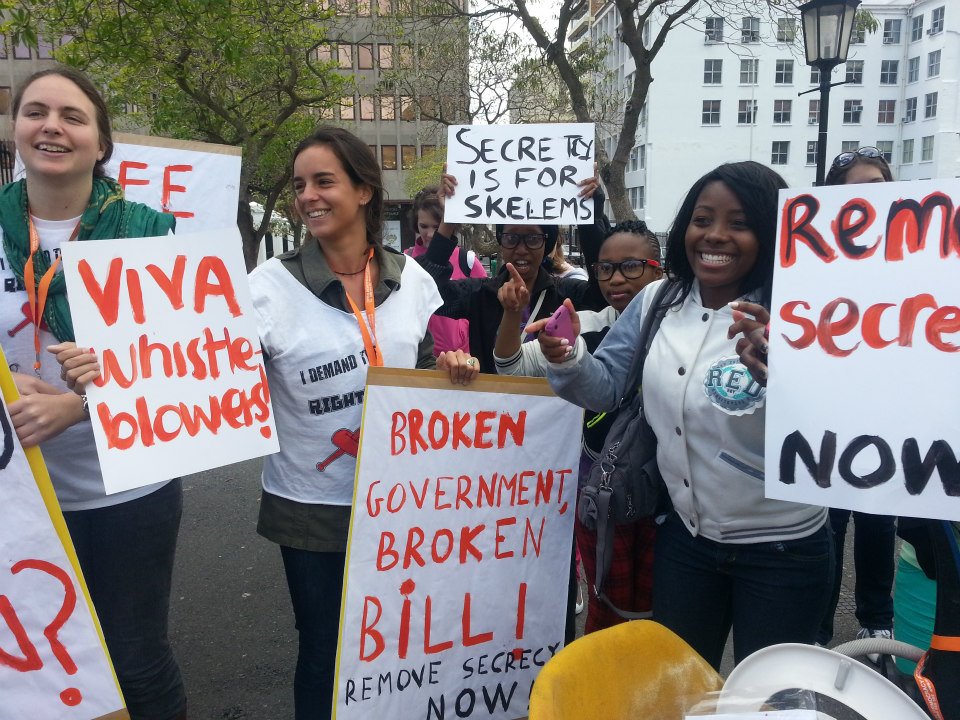Info Bill battle likely to predominate again
The following article was pubilished on line the IOL news
Parliament looks set to kick off the new year in much the same manner as it ended the last – by managing a bitter battle over the Protection of State Information Bill.The controversial bill came in for unprecedented civil society condemnation and protest last year. This was thanks in part to the absence of a so-called public interest defence clause, which would protect whistleblowers from stiff prison sentences if they revealed classified information, provided the disclosure could be shown to have been done in the public interest.
Critics also fear that the bill in its current form would place too much discretionary power to classify information in the hands of politicians and public servants – and thus risk becoming a mechanism for burying embarrassing or incriminating state information.
However, ANC MPs have steadfastly maintained that the bill contains sufficient protection against abuse.
During a heated National Assembly debate on the subject in November, State Security Minister Siyabonga Cwele went as far as accusing those calling for a public interest defence of being in cahoots with foreign intelligence services. A week later, the ANC muscled the bill through the house with 229 votes against 107.
Significantly, opponents of the bill include Cosatu, the ANC’s influential tripartite alliance partner, and the Right2Know campaign, which represents more than 400 NGOs united in their opposition to the proposed law.
The SA National Editors’ Forum has since asked Public Protector Thuli Madonsela to investigate whether the minister’s arguably libellous accusations enjoyed parliamentary privilege, as he made the same claims during a media briefing outside the Assembly.
Cwele also told MPs that “no country in the world” allowed the “reckless practice” of including a public interest defence mechanism in its state secrets regime, a claim widely disputed.
Madonsela has also agreed to investigate whether these comments were a “bona fide mistake” or constituted an intention to mislead Parliament.
Her involvement in the matter has infuriated both the ANC and Parliament, with officials from both organisations having warned her to butt out of the issue and allow Parliament to process the legislation without interference.
The bill is now before a multiparty ad hoc committee of the National Council of Provinces, chaired by ANC MP Raseriti Tau. The committee is to hold its first substantive meeting in late January and is expected to complete its work by April.
The DA fired the first salvo in the renewed battle yesterday, with MP and ad hoc committee member Alf Lees calling on Tau to make the public consultation programme available without delay.
Tau could not be reached for comment.
The need for greater public consultation on the issue was illustrated by recent research which suggested that despite a widely publicised debate about the bill, up to 40 percent of township residents were unaware of its existence.
A survey conducted by Cape Town-based ikapadata among 1 108 residents of townships around Joburg, Cape Town and Durban in the first half of last month revealed that 21 percent of respondents said the bill would be good for South Africa, 25 percent said it would be bad, 14 percent had heard of it but had no opinion on the subject and 40 percent claimed never to have heard of it.
The info bill is just one of several on the parliamentary agenda this year. Legislators successfully passed 28 bills last year, and this year will be equally busy, with 17 proposed laws already on the programme and more expected to be introduced.
* Meanwhile, parliamentary staff have already begun sprucing up the legislative precinct with fresh coats of paint and other maintenance in preparation for Parliament’s first major event for the year – the State of the Nation Address by President Jacob Zuma on February 9, which also heralds the opening of Parliament.
The address will again be delivered at 7pm to allow as many citizens as possible to follow the live television broadcast. – Political Bureau
Source IOL



